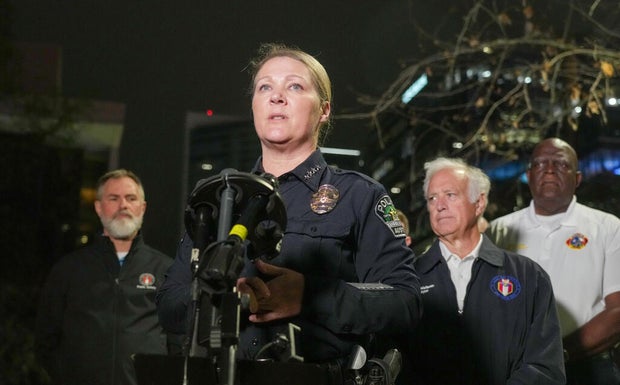News
California valedictorian will no longer give graduation speech over ‘alarming’ discussion

The University of Southern California says Asna Tabassum will no longer speak at the ceremony after the discussion about her selection took on ‘an alarming tenor’
The University of Southern California said its valedictorian will no longer deliver a graduation speech this year, citing “substantial risks relating to security” over social media chatter surrounding the Israel-Hamas conflict.
The Los Angeles school revealed that Asna Tabassum, a fourth-year student from Chino Hills, California, was selected as the valedictorian and would give a speech alongside two salutatorians. In a news release Monday, the university said she would no longer speak at the ceremony after the discussion about her selection took on “an alarming tenor.”
The move comes after some students, alumni and others complained to the university about Tabassum’s social media, which includes an Instagram bio that links to a pro-Palestine website.
“The intensity of feelings, fueled by both social media and the ongoing conflict in the Middle East, has grown to include many voices outside of USC and has escalated to the point of creating substantial risks relating to security and disruption at commencement,” Provost Andrew Guzman said in a statement.
Guzman said the school can not ignore that similar risks led to harassment and violence at other campuses. He added that the school’s Department of Public Safety and campus safety team have consulted to evaluate potential threats for graduation, which typically draws around 65,000 people.
“This decision is not only necessary to maintain the safety of our campus and students, but is consistent with the fundamental legal obligation – including the expectations of federal regulators – that universities act to protect students and keep our campus community safe,” he said.
Groups call to reverse USC decision
Tabassum addressed the university’s decision in a statement released through the Council on American-Islamic Relations-Los Angeles.
“Although this should have been a time of celebration for my family, friends, professors, and classmates, anti-Muslim and anti-Palestinian voices have subjected me to a campaign of racist hatred because of my uncompromising belief in human rights for all,” Tabassum said.
The council said the school’s decision empowers voices of hate, violates its obligation to project students and “sends a terrible message to not only Muslim students at USC but all students who dare to express support for Palestinian humanity.” It’s also urging the community to demand the school to allow Tassabum to speak at graduation.
Among the calls against Tassabum as a graduation speaker were student group “Trojans For Israel,” who said her selection turned “an inclusive and meaningful milestone into an unwelcoming and intolerant environment for Jewish graduates and their families.”
The 2024 commencement ceremony is scheduled for Friday, May 10.
War in Gaza stokes controversy worldwide
Controversies over the ongoing Israel-Hamas conflict have been amplified since Oct. 7, 2023, when Hamas militants launched a brutal attack on Israel, killing approximately 1,200 people.
Over 30,000 Palestinians have died in Gaza since that day. The region is also difficult to access, leaving many civilians displaced and facing famine.
The crisis had led to protests for the release of Israeli hostages and to call for a ceasefire in Gaza, with those speaking out in support of Israelis and Palestinians on social media receiving threats.
Contributing: Kinsey Crowley

News
Satellite images provide view inside Iran at war

Smoke rises over Konarak naval base in southern Iran on Sunday. The base was one of hundreds of targets of U.S. and Israeli forces throughout the country.
Planet Labs PBC
hide caption
toggle caption
Planet Labs PBC
Commercial satellite images are providing a unique look at the extent of damage being done to Iran’s military facilities across the country.
The U.S. and Israeli military campaign opened with a daytime attack that struck Iranian leadership in central Tehran. Smoke was still visible rising from Ayatollah Ali Khamenei’s compound following the attack that killed the supreme leader.

An image by the company Airbus taken on Saturday shows the aftermath of an Israeli strike on Iran’s Leadership House in central Tehran. Iran’s Supreme Leader Ayatollah Ali Khamenei was killed in the opening wave of attacks.
Pléiades Neo (c) Airbus DS 2026
hide caption
toggle caption
Pléiades Neo (c) Airbus DS 2026
Israel and the U.S. have gone on to strike targets across the country. Reports on social media indicate that there have been numerous military bases and compounds attacked all over Iran, and Iran has responded with attacks throughout the Middle East.
U.S. forces have also been striking at Iran’s navy. In a post on his social media platform, President Trump said that he had been briefed that U.S. forces had sunk nine Iranian naval vessels. U.S. Central Command did not immediately confirm that number but it did say it had struck an Iranian warship in port.

An image captured on Saturday shows a ship burning at Iran’s naval base at Konarak.
Satellite image ©2026 Vantor
hide caption
toggle caption
Satellite image ©2026 Vantor
Numerous satellite images show burning vessels at Konarak naval base in southern Iran. Images also show damage to a nearby airbase where hardened hangers were struck by precision munitions.

Hardened aircraft shelters at Konarak airbase were struck with precision munitions.
Satellite image ©2026 Vantor
hide caption
toggle caption
Satellite image ©2026 Vantor
And there was extensive damage at a drone base in the same area. Iran has launched numerous drones and missiles toward Israel and U.S. military installations in Bahrain, Kuwait and Qatar. Many drones have been intercepted but videos on social media show that some have evaded air defenses and caused damage in nearby Gulf countries. In Dubai, debris from an Iranian drone damaged the iconic Burj Al Arab, according to a statement from Dubai’s government.

Buildings at an Iranian drone base at Konarak were destroyed in the strikes.
Satellite image ©2026 Vantor
hide caption
toggle caption
Satellite image ©2026 Vantor
Iran’s most powerful weapons are its long-range missiles. The Iranian Revolutionary Guards have hidden the missiles deep inside mountain tunnels. Images taken Sunday in the mountains of northern Iran indicate that some of those tunnels were hit in a wave of strikes.
Following Khamenei’s death, Iran declared 40 days of mourning. Satellite images showed mourners gathering in Tehran’s Enghelab square on Sunday.
Iranian Foreign Ministry Spokesperson Esmail Baghaei told NPR on Sunday that Iran will continue to fight “foreign aggression, foreign domination.”
A White House official told NPR that Trump plans to talk to Iran’s interim leadership “eventually,” but that for now, U.S. operations continue in the region “unabated.”

A large crowd of mourners fill Enghelab Square in Tehran on Sunday, following the death of Iran’s Supreme Leader Ayatollah Ali Khamenei, who was killed in an Israeli airstrike.
Satellite image ©2026 Vantor
hide caption
toggle caption
Satellite image ©2026 Vantor
News
Video: What the Texas Primary Battle Means for the Midterms

new video loaded: What the Texas Primary Battle Means for the Midterms
By J. David Goodman, Alexandra Ostasiewicz, June Kim and Luke Piotrowski
March 1, 2026
News
Mass shooting at Austin, Texas bar leaves at least 3 dead, 14 wounded, authorities say

Gunfire rang out at a bar in Austin, Texas, early Sunday and at least three people were killed, the city’s police chief said.
Austin Police Chief Lisa Davis told reporters the shooter was killed by officers at the scene.
Fourteen others were hospitalized and three were in critical condition, Austin-Travis County EMS Chief Robert Luckritz said.
“We received a call at 1:39 a.m. and within 57 seconds, the first paramedics and officers were on scene actively treating the patients,” Luckritz said.
There was no initial word on the shooter’s identity or motive.
Davis noted how fortunate it was that there was a heavy police presence in Austin’s entertainment district at the time, enabling officers to respond quickly as bars were closing.
“Officers immediately transitioned … and were faced with the individual with a gun,” Davis said. “Three of our officers returned fire, killing the suspect.”
She called the shooting a “tragic, tragic” incident.
Austin Mayor Kirk Watson said his heart goes out to the victims, and he praised the swift response of first responders.
“They definitely saved lives,” he said.
Davis said federal law enforcement is aiding the investigation.
-

 World4 days ago
World4 days agoExclusive: DeepSeek withholds latest AI model from US chipmakers including Nvidia, sources say
-

 Massachusetts4 days ago
Massachusetts4 days agoMother and daughter injured in Taunton house explosion
-

 Montana1 week ago
Montana1 week ago2026 MHSA Montana Wrestling State Championship Brackets And Results – FloWrestling
-

 Denver, CO4 days ago
Denver, CO4 days ago10 acres charred, 5 injured in Thornton grass fire, evacuation orders lifted
-

 Louisiana7 days ago
Louisiana7 days agoWildfire near Gum Swamp Road in Livingston Parish now under control; more than 200 acres burned
-

 Technology1 week ago
Technology1 week agoYouTube TV billing scam emails are hitting inboxes
-

 Technology1 week ago
Technology1 week agoStellantis is in a crisis of its own making
-

 Politics1 week ago
Politics1 week agoOpenAI didn’t contact police despite employees flagging mass shooter’s concerning chatbot interactions: REPORT























